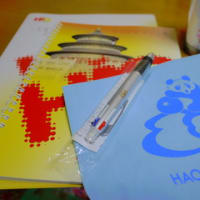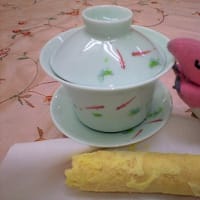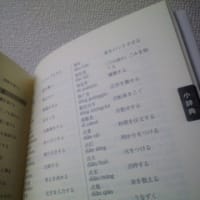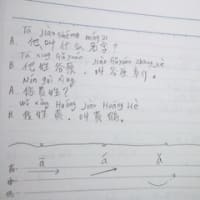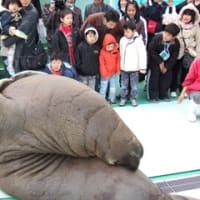な、なんと・・・ペンパルが添削してくれました。まさかこんなクソ長いものを、こんなにも丁寧に直して教えてもらえるなんて・・・!感激しちゃいました 読んでもらえるだけでありがたいのに・・苦笑。
読んでもらえるだけでありがたいのに・・苦笑。
 読んでもらえるだけでありがたいのに・・苦笑。
読んでもらえるだけでありがたいのに・・苦笑。気をつけてたつもりなのに、なんでしょう・・この ’a’とかの抜けっぷりは・・・ スペル間違ってみたり・・・不規則変化だっちゅうに、edとかつけちゃってるし!まだまだだな・・。
スペル間違ってみたり・・・不規則変化だっちゅうに、edとかつけちゃってるし!まだまだだな・・。
 スペル間違ってみたり・・・不規則変化だっちゅうに、edとかつけちゃってるし!まだまだだな・・。
スペル間違ってみたり・・・不規則変化だっちゅうに、edとかつけちゃってるし!まだまだだな・・。ノバで、つなげたほうが読みやすい・・と講師に言われ、長~くした部分が・・元の分離したものに直ってきました。どうも、人それぞれの好みみたいですね。
そんなわけで、ペンパルでもあり、れもンの英語の先生でもあるスコットの添削の紹介です

There was a large park in the city where Ken lived.(start new sentence) The park didn't have a playground for the kids, but nonetheless Ken loved going there (no comma) since he was a little boy.
The park had an old huge cherry tree. He didn't know how old that tree was, but he guesed it was over 500 years old because the trunk was mammothlike.
Ken came to see the tree (no comma) whenever he felt angry, worried, or sad at home or school. He loved to lay down under the tree on the lawn with his daydream. He was able to do anything, got everything he wanted, went everywhere he wanted to go.(new sentence) He could say clearly " No " to his parents , teachers,(comma) and friends in his imaginary world or world of imagination. Read my note at the end.
Ken was a 15 year old junior highschool student. He was pure Japanese, but he looked like a foreigner, because he was the tallest boy in his school, and he had clear skin , hazel eyes, and his hair sometimes looked blonde (especially under the sun) (I added parentheses).
He was a really handsome boy , so of course he was idolized by the girls, but it was only a first impression until the girls learned of his character.
He always agreed with everyone. He had no opinion. He had never decided anything for himself. He had a lot of friends, but none of them were his close friend. However, he didn't mind it, because he was a reclusive type and he loved being alone with the tree.
The tree always wrapped gently around his lonely heart. Sutekina shi ne 

One warm spring evening, Ken was there. Ken looked up and gazed blankly at the pale sky beyond light pink flowers. He slid his right hand into his pocket, pulled out a small stuffed animal, (comma) and then (no comma) he took the animal's tail with his fingers and swang it in front of his face.
"Actually, I didn't need you...." he grumbled (good word!) to the toy. He bought it yesterday when he went down the street on his way home from cram school. He felt thirsty and was going to look in a convenience store. It was wrong of him in the first place. He turned left at a liquor shop and then he noticed an ancient-looking shop.
"Wow...I didn't know that there was a curiosity shop in my town..!." Ken yelled.
The shop's signboard said the shop's name was " Parallel world" . Ken took an interest in the shop. (good idiom - "took an interest in") He propped his bicycle against a wall, stood outside the shop, took a hard look inside the shop. (read my note at the end)
"Wow...I didn't know that there was a curiosity shop in my town..!." Ken yelled.
The shop's signboard said the shop's name was " Parallel world" . Ken took an interest in the shop. (good idiom - "took an interest in") He propped his bicycle against a wall, stood outside the shop, took a hard look inside the shop. (read my note at the end)
The shop had lots of marvelous furnishings, strangely shaped chair, queer ornaments, specimens of insects, stuffed bears,(comma) and so on.
Suddenly, the owner who had thin and white hair noticed Ken, and beckoned him into his shop. He looked about 80 years old. He wore spectacles. The very thick glasses made his eyes look bigger. If he straightened his back, he might have been tall, but he was bent with age, so (no comma) he was only as tall as Ken's waist. He wore a deep green knitted hat and worn-out yellowish thin sweater with a queer emblem. Ken thought the owner had poor taste in clothes, and he seemed as strange as his shop.
Ken went into the shop. The inside of the shop was bigger than he expected. He found a great many clocks; (semicolon) pendulum clocks, cuckoo clocks, grandfather clocks, pocket watches, table clocks and sandglasses (we call it "hourglasses"). Some of them turned counterclockwise. Some of them had extra time, " 45:00?! " he gasped, but the owner said calmly " No wonder, the clock was used a country that had 45 hours in a day."

NOTES
"...in his imagination world." You are describing the noun "world". Describing is the job of adjectives, so the adjective form of the noun "imagination" is "imaginary".
past tense of "slide" = "slid" (not "slided"). Some verbs do not use "-ed" for past tense. Example: you know the past tense of "feel" is not "feeled", but "felt". Wasure nikui ne.
"....took a look inside the shop hardly." Very good LeMON. You know the adjective "hard" and you know to add "ly" to make an adverb. But in modern English, this word "hardly" means a different thing. It means "barely" (karoujite? nantoka?). Many Americans ask this joke question
"Are you working hard, or hardly working?" 

It is a "word joke" because "hardly working" means doing only a little bit of work.
You use the word "queer" correctly. It means "strange" or "odd". But I will warn you - to Americans and Canadians (not so much British or Austrailians), the word "queer" means "douseiaisha"

The other mistakes are just typical Nihonjin eigo mistakes.
Remember to use articles (the, an, a) when you talk about something that is (or was) physically present, or when you talk about a specific individual object.
Example: "I like sushi" (I don't say "the sushi" because I am not talking about a specific sushi - I like sushi generally .)
"Please pass the sushi" (Here, there is sushi present, you can see it. We could say "Please pass that sushi".)
If someone asks me "Which food is good in that restaurant?", I can answer
"I like the sushi". Wakarimasuka? Because I am talking about the specific sushi in that restaurant.










